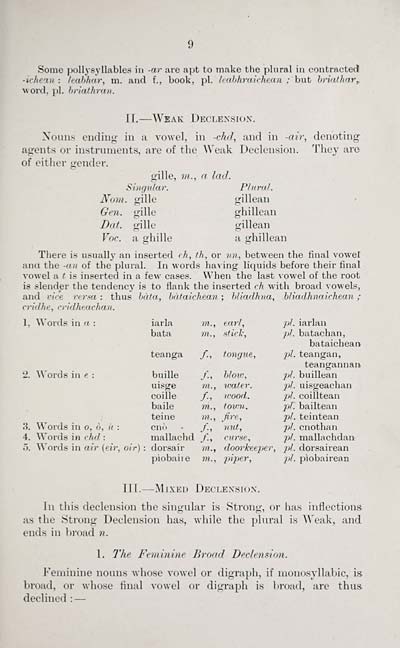Download files
Complete book:
Individual page:
Thumbnail gallery: Grid view | List view

Some pollysyllables in -ar are apt to make the plural in contracted
-n'ltr'iii : Idihhàr, m. and f., book, pi. Imhhrnirhenn .-but hriathar^
word, pi. hrinthnni.
II. — Weak I )kclen>;u)X.
Nouns ending in a vowl'I, in -chrJ, and in -air, denoting-
agents or instruments, are of the Weak Declension. They are
of either u-ender.
InJ.
Siiiuuhir.
Nom. gille
Gen. gille
Dat. gille
Voc. a ghille
usuallv an inserted
■h, til,
Plural.
gillean
ghillcan
gillean
a ghillean
iv, between the final vowel
There
unci the -un of the plural. In words having liquids before their final
vowel a t is inserted in a few cases. When the last vowel of the root
is slender the tendency is to flank the inserted ch with broad vowels,
and vice nrsa : thus hùta, hàtaichean ; hìiadhtia, bliadhnnichean ;
rrldhe, rri<lh<:achaii.
1. Words
2. Words in
Words in o, ò.
Words in chd -.
'i. Words in air {fir, oir)
III. — Mjxeij Declension.
In this declension the singular is Strong, or has inflections
as the Strong Declension has, while the plural is Weak, and
ends in broad n.
1. The Feminine Broad Declension.
Feminine noun.s whose vowel or digraph, if mond.syllahic, i*
broad, or whose final vowel or digraph is broad, are thus
declined : —
-n'ltr'iii : Idihhàr, m. and f., book, pi. Imhhrnirhenn .-but hriathar^
word, pi. hrinthnni.
II. — Weak I )kclen>;u)X.
Nouns ending in a vowl'I, in -chrJ, and in -air, denoting-
agents or instruments, are of the Weak Declension. They are
of either u-ender.
InJ.
Siiiuuhir.
Nom. gille
Gen. gille
Dat. gille
Voc. a ghille
usuallv an inserted
■h, til,
Plural.
gillean
ghillcan
gillean
a ghillean
iv, between the final vowel
There
unci the -un of the plural. In words having liquids before their final
vowel a t is inserted in a few cases. When the last vowel of the root
is slender the tendency is to flank the inserted ch with broad vowels,
and vice nrsa : thus hùta, hàtaichean ; hìiadhtia, bliadhnnichean ;
rrldhe, rri<lh<:achaii.
1. Words
2. Words in
Words in o, ò.
Words in chd -.
'i. Words in air {fir, oir)
III. — Mjxeij Declension.
In this declension the singular is Strong, or has inflections
as the Strong Declension has, while the plural is Weak, and
ends in broad n.
1. The Feminine Broad Declension.
Feminine noun.s whose vowel or digraph, if mond.syllahic, i*
broad, or whose final vowel or digraph is broad, are thus
declined : —
Set display mode to: Large image | Transcription
Images and transcriptions on this page, including medium image downloads, may be used under the Creative Commons Attribution 4.0 International Licence unless otherwise stated. ![]()
| Early Gaelic Book Collections > Hew Morrison Collection > How to learn Gaelic > (21) |
|---|
| Permanent URL | https://digital.nls.uk/79790391 |
|---|
| Description | A selection of items from a collection of 320 volumes and 30 pamphlets of literary and religious works in Scottish Gaelic. From the personal library of Hew Morrison, the first City Librarian of Edinburgh. |
|---|
| Description | Selected items from five 'Special and Named Printed Collections'. Includes books in Gaelic and other Celtic languages, works about the Gaels, their languages, literature, culture and history. |
|---|

